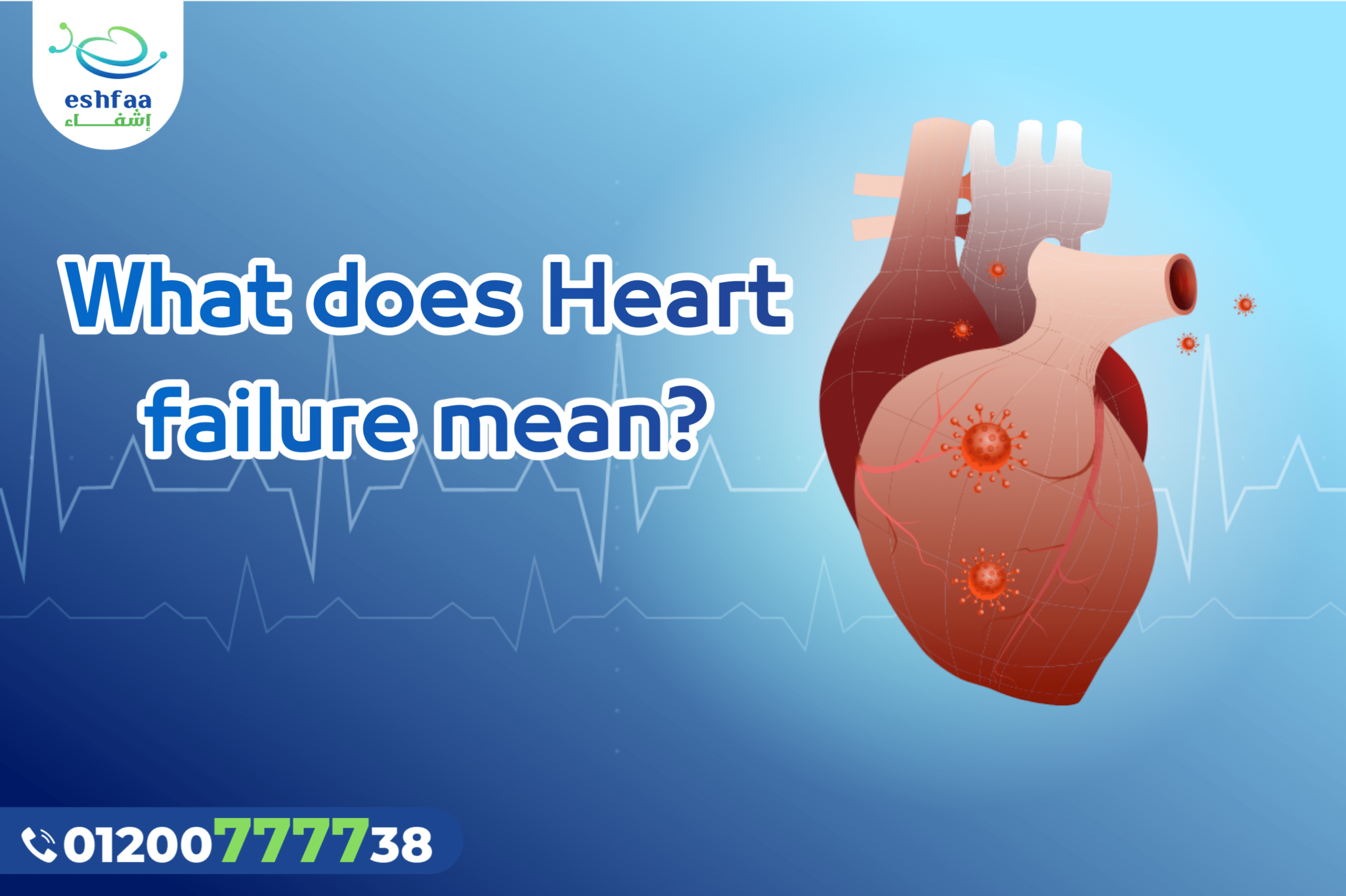Heart muscle failure does not mean that the heart is no longer functioning yet, but it needs some help to function better. It is usually a chronic disease whose symptoms do not improve, but they can be controlled for many years, especially if it is detected early and the appropriate treatment plan is followed, which reduces complications. and increases the level of improvement.
What is heart failure?
For some reason, the heart becomes unable to pump the amount of blood needed for the rest of the body’s organs, so the blood accumulates in the heart chambers and retreats from there to accumulate inside the lungs, causing many health problems, and the rest of the body’s organs are affected, why not, when blood is their way to obtain the oxygen necessary to carry out their vital functions properly. .
All of this happens either as a result of the heart muscle becoming weak and unable to contract to pump blood normally, or it has become more rigid and unable to relax so that the heart chambers are filled with blood.
Heart failure can occur in only the right side of the heart, only the left side, or both.
Heart failure can be a chronic disease whose symptoms remain in the long term, and this represents most cases. It can also occur suddenly and acutely as a result of a heart attack or the presence of some problems in the heart valves. In this case, symptoms usually improve in a short time.
Symptoms of heart failure:
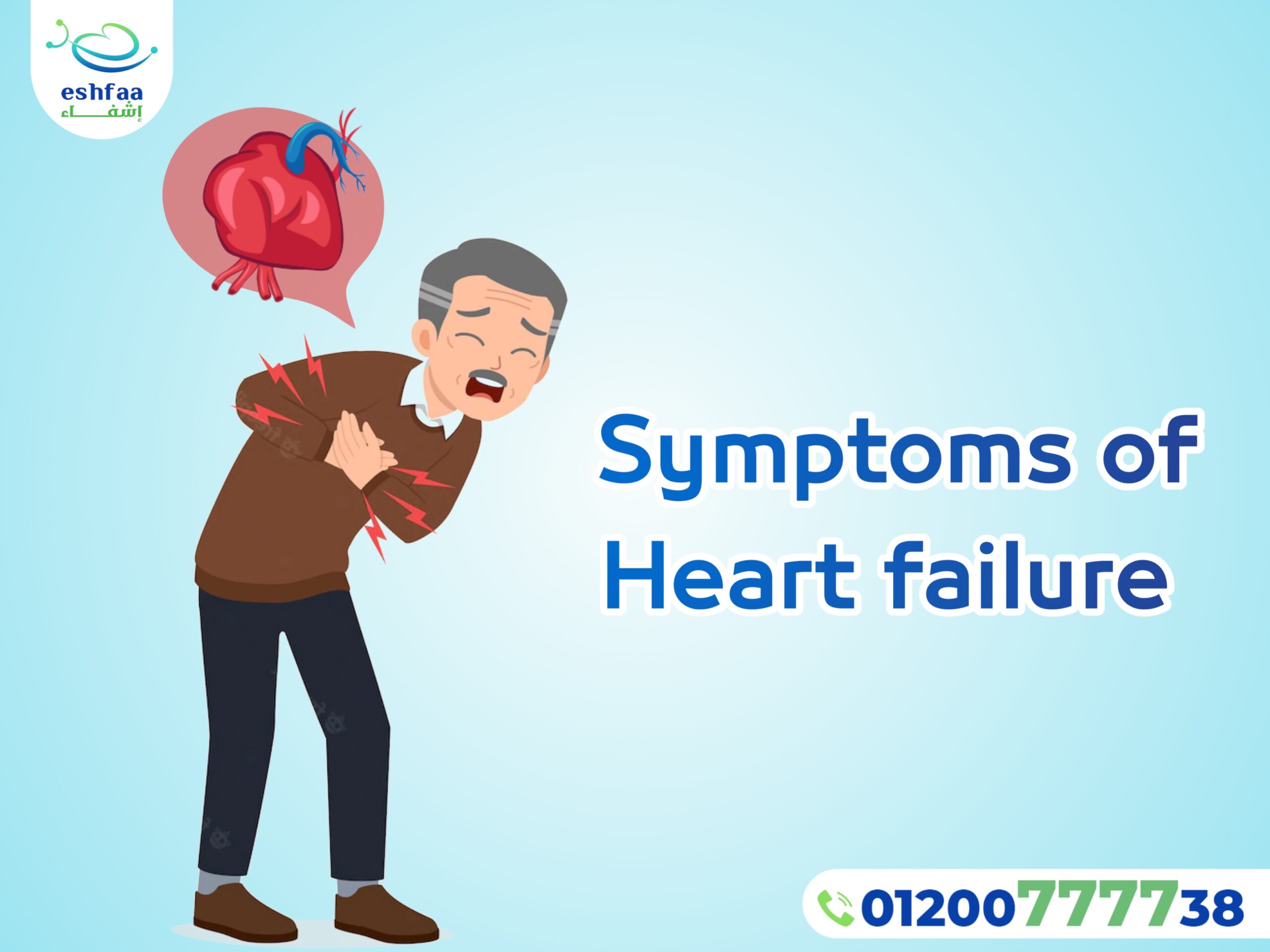
- Fatigue and general weakness
- Inability to make an effort
- Sudden weight gain due to fluid buildup in the body
- loss of appetite
- Chronic cough
- Disturbance and increase in heart rate
- Abdominal distension
- Swelling of the feet and legs
- Neck veins bulge and appear noticeably
- shortness of breath
- Not being able to breathe well when lying on the back
- Use more than one pillow while sleeping to improve breathing
Causes of heart failure:

Heart muscle failure is usually the result of another disease that causes the heart to fail to function normally. One of the most famous of these diseases is coronary atherosclerosis, which causes narrowing of the arteries that supply the heart with blood and oxygen. This occurs as a result of the accumulation of fatty deposits in the arteries and causes a lack of blood flow. blood to the heart and may lead to a heart attack if a complete blockage occurs in a coronary artery.
There are many other reasons such as:
- The presence of some congenital defects in the heart muscle
- valvular heart disease
Because healthy heart valves keep blood flowing in the right direction, and when any damage occurs to them, the heart is forced to work harder, which will lead to weakness.
- Heart muscle damage due to many causes such as infection, alcohol abuse, and some types of cancer treatments such as chemotherapy
- myocarditis
- myocardial hypertrophy
- Arrhythmia
- Hypertension
This causes the heart to work harder to pump blood to the body and over time the heart muscle becomes weaker or stiffer and unable to do its job.
- diabetes
- HIV infection
- Severe anemia
- Excessive weight gain
- Increased thyroid activity
Types of heart failure:
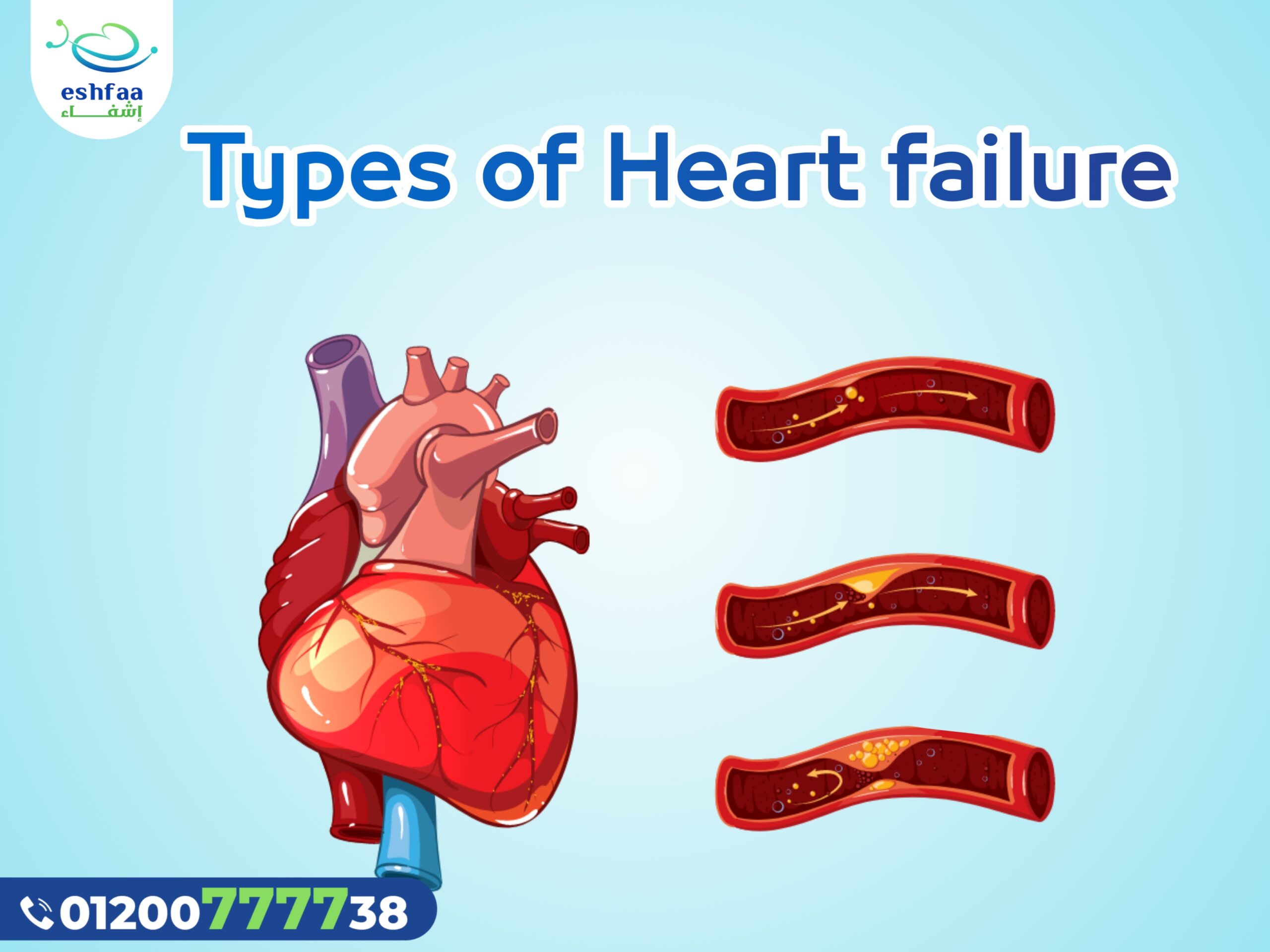
Heart failure can occur in the right side of the heart, the left side, or both.
We will also learn about systolic and diastolic heart failure.
- Left sided myocardial infarction
Most commonly, the left ventricle located in the lower left side of the heart is responsible for pumping out oxygenated blood to the body.
The failure of the left side of the heart muscle occurs when the left ventricle becomes unable to pump blood sufficiently, and thus the blood backs up to accumulate in the lungs and causes difficulty in breathing and fluid accumulation in the body.
2. Failure of the right side of the heart muscle
The right ventricle is responsible for pumping deoxygenated blood from the heart to the lungs so that gas exchange occurs and is loaded with oxygen, and failure of the right side of the heart muscle occurs when the right ventricle becomes unable to perform its function.
This usually occurs as a result of failure of the left side of the heart muscle and the accumulation of fluid in the lungs, which impedes the ability of the right ventricle to pump blood to the lungs and makes it more difficult.
In this case, fluid reflux occurs to the abdomen, feet and legs, causing swelling.
3. Systolic heart failure
It occurs when the heart muscle becomes weak, losing its ability to contract to pump blood to the body, and this type is more common in men than in women.
4. Diastolic heart failure
In this case, the heart muscle becomes more rigid than normal as a result of other heart diseases, and the heart loses its ability to expand to fill with blood, which leads to a lack of blood supply to the rest of the body, and is more common in women.
Risk factors that increase the incidence of heart failure:

Heart failure can happen to anyone, but there are some diseases that increase the risk:
- Hypertension
- diabetes
- Coronary artery disease
- Diseases of the heart valves
- Anemia
- Increased thyroid activity
- Hypothyroidism
Also some negative lifestyle behaviors such as:
- smoking
- A diet high in fat and cholesterol
- Excessive weight gain
- Laziness and lack of exercise
How is heart failure diagnosed?
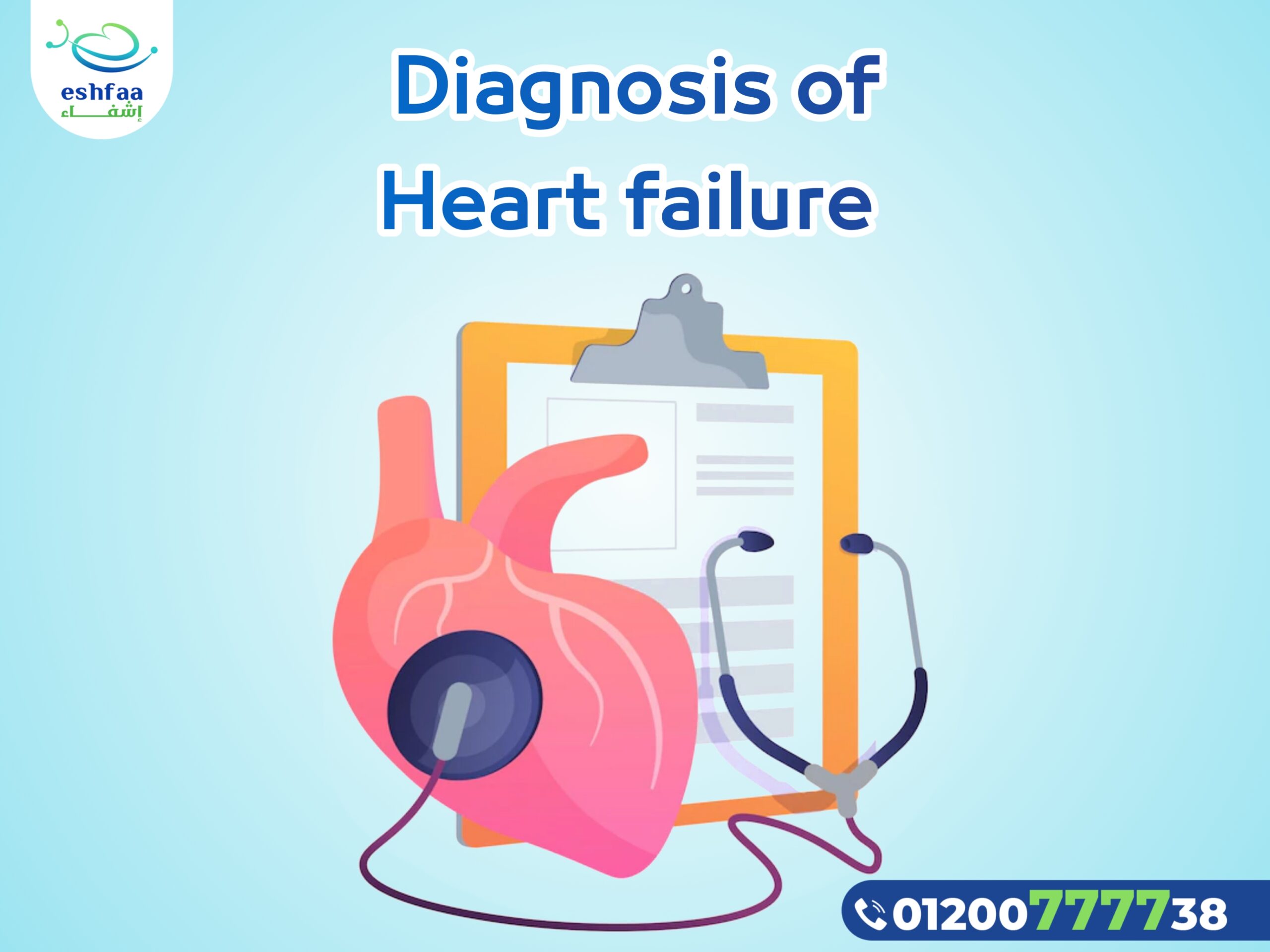
The doctor begins by knowing the patient's medical history and then begins the clinical examination, checking for signs of heart muscle failure, such as irregular heartbeat, swelling of the feet and legs, and bulging neck veins.
After that, the doctor orders some medical tests to confirm the diagnosis, such as:
- Ultrasound of the heart (echocardiogram): It is the most accurate examination for diagnosing heart failure, and it uses waves that give a complete picture of the heart, allowing the doctor to know the damage in the heart, and through it, he also knows the systolic and diastolic capacity of the heart.
- Ultrasound of the heart (echocardiogram): It is the most accurate examination for diagnosing heart failure, and it uses waves that give a complete picture of the heart, allowing the doctor to know the damage in the heart, and through it, he also knows the systolic and diastolic capacity of the heart.
- heart drawing
- Magnetic resonance imaging of the heart
- Atomic scan on the heart
- Diagnostic catheterization of the heart
- Stress test: This is a test that measures the function of the heart during exercise.
- Measurement of the level of cholesterol in the blood
- Measurement of the level of certain peptides in the blood, which can be an indicator of heart failure (BNP blood test))
treatment of heart failure
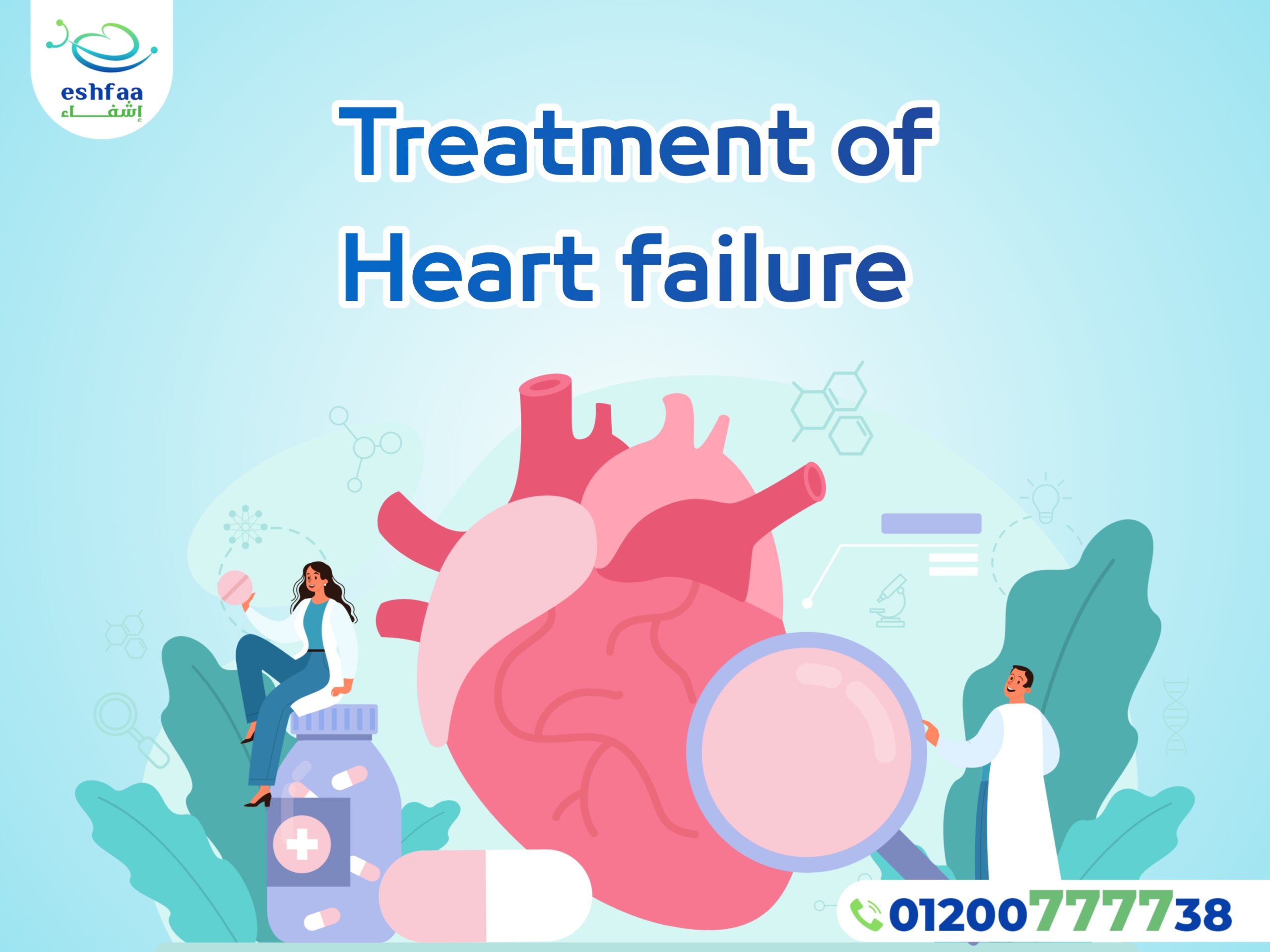
Heart failure is a chronic disease that requires a lifelong treatment plan. The treatment plan depends on the severity of the condition and the type of heart failure.
Early detection of the disease and initiation of appropriate treatment significantly improves symptoms and reduces expected complications. The treatment plan requires regular follow-up and repetition of examinations every three to six months.
The treatment plan includes one or more of the following types of treatments:
1. Pharmacological treatment
It can be relied upon in the treatment plan in the early stages of the disease to relieve symptoms and prevent the situation from developing for the worse, as:
- It improves the heart's ability to pump blood.
- Reduces the occurrence of blood clots.
- It works to regulate the heartbeat.
- Reduces the level of cholesterol in the blood.
- It reduces the level of sodium in the blood and increases the level of potassium.
2. Surgery
In some cases, the doctor may resort to surgical intervention to replace heart valves, coronary artery surgeries, or implant pacemakers and implantable defibrillators.
All previous treatment methods may fail in some cases, leaving the heart transplant option, but the process is not suitable for everyone, and the patient's condition will be evaluated first to see if the operation is a safe option or not.
What are the complications of heart failure?

Heart failure can lead to many health problems if the appropriate treatment plan is not followed:
- Stroke or heart attack.
- Kidney failure.
- Arrhythmia.
- blood clots
- liver damage
Prevention of heart failure

Adopting a healthy lifestyle helps prevent heart disease and prevent complications.
- Maintain a moderate weight
- Playing sports
- Reduce salt in food
- Reducing fat in food
- Quit Smoking
the reviewer
https://www.healthline.com/health/heart-failure
https://www.nhs.uk/conditions/heart-failure/
https://www.mayoclinic.org/diseases-conditions/heart-failure/symptoms-causes/syc-20373142

